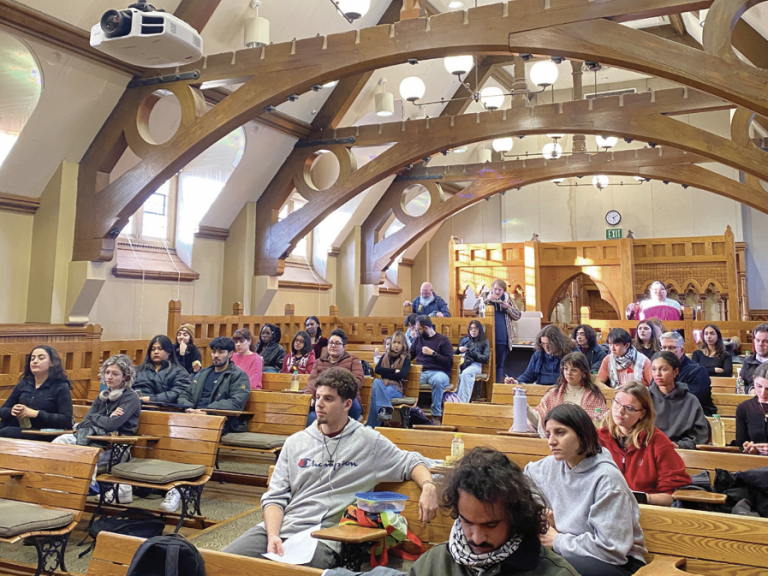Rajsi Rana ’26
News Editor
On March 27, an event titled “Power and the Possibilities of Remembering: Unearthing Hidden Black Histories in NYC” brought guest speaker Alex Manevitz ‘09 to Trinity. This event was held in collaboration with the Hidden Black Connecticut Research Cluster, Trinity Social Justice Institute, American Studies and History Departments. During this event, several important pieces of history were covered, including those of the land and its people focusing on New York City and Hartford. In addition to historical events being discussed, current and ongoing projects at Trinity relevant to the conversation were brought up, including The Primus Project and the research cluster Hidden Black History in CT and Hartford, as part of the Social Justice Initiative at Trinity led by American Studies Professor Christina Heatherton. Professor Heatherton introduced the event, acknowledging that Trinity’s campus sits on stolen land.
Manevitz, a historian, educator and public scholar, began the event by discussing some of New York’s history, starting with the past of Seneca Village now known as Central Park. Seneca Village was a community of free African-Americans and Irish immigrants, many of whom were property owners with high rates of income and literacy in the 1850s. On that land, they lived, farmed and buried their loved ones, as well as attended school and church. Through eminent domain (the law that allows the government to take private land for public use with compensation paid to the landowner) the city acquired this land and forced residents out in 1857. The public was under the impression that people were living in unsafe and unhygienic conditions. From that point on, the land was developed into what is now known as Central Park.
Manevitz dug deeper, discussing past stories of individuals who lived on that land. Sarah Wilson was one of three Black homeowners in New York at that time. Women as property owners had several restrictions until 1878. From there, Manevitz transitioned to telling contemporary tales. He described the exhibit “Before Yesterday We Could Fly: An Afrofuturist Period Room” as an exhibition at the Metropolitan Museum of Art that showcases a “fabrication of a domestic space” and embraces the idea that the past, present and future are interconnected. Manevitz said, “The way we talk about our past affects our present.
From there, Manevitz dove into hidden histories at Trinity. Previously known as Washington College, Trinity has had several prominent people in its history. Many of these people lived unethically and benefited from immoral events and systems. The Primus Project is a research project on the topic of slavery, race and reconstruction at Trinity. The project “aspires to tell a truer and fuller story of Trinity’s history than most people know.” The project has conducted research on several prominent figures of Trinity’s past, including Nathaniel Wheaton, Charles Sigourney, George Washington Doane, Samuel Seabury, James Williams and John J. Mccook. Additionally, the project researches confederate symbolism at Trinity College.
From there, students Ifunaya Obidike ‘27 and Nicole Ankrah ‘26 asked Manevitz questions. Obidike asked a question regarding the identity of Manevitz and if it played a role in his research interests. “Being a non-Black man, why are you fascinated by the lives and stories of Black people compared to other groups of people?” Manevitz answered, “I’m trying to figure out why things I care about today happened,” expanding on how, for the most part, throughout his schooling, there were several untouched topics in American history, separating American history and Black history as if one could be taught without the other. “It was the most important part of history I didn’t know about.” He found that there were many ‘erased topics’ in history education
The event ended with a few questions from the audience. One audience member brought up the global quality of Central Park, and its place as a tourist attraction. They asked if Manevitz could discuss the global audience that ties in with his research. Manevitz replied by saying that his research and arguments were limited to the United States thus far. However, he brought up other similar patterns around the world such as U.S. imperialism and its effects in the Philippines.
This talk was incredibly informative, bringing to light some of the cruelest events in history. Manevitz, in addition to providing the audience with the quiet events in the history of the New England area, also discussed information from several important ongoing research projects at Trinity, displaying the importance of understanding present events in addition to the past, to look to the future.




+ There are no comments
Add yours